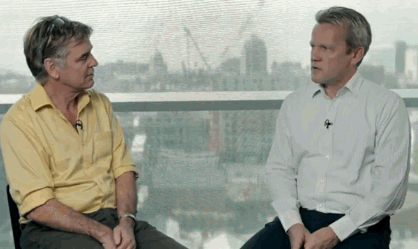
|
News & Views item - September 2012 |
![]() Finnish Education Guru Discusses What's Needed -- Better Education Not Just
for Some Teachers but for All of Them. (September 28, 2012)
Finnish Education Guru Discusses What's Needed -- Better Education Not Just
for Some Teachers but for All of Them. (September 28, 2012)
In today's issue of The Conversation Professor John Hattie (left), director of the Melbourne Education Research Institute at the University of Melbourneís Graduate School of Education discusses with Pasi Sahlberg (right), Director General of the Centre for International Mobility and Cooperation (CIMO) in the Ministry of Education in Finland, what's required for developing and maintaining one of the best performing and most equitable systems in the OECD.
Here we reprint salient excepts followed by observations by Ian Dobson* who is well acquainted with both the Finnish and Australian environments.
We decided when we started to build the current education system 40 years ago, we realised that if you have a system that is aiming to be, not number one but, equitable so that every child will be having opportunity and pathways to be successful, that requires teachers that are better educated. And better education not just for some teachers but for everybody, all of them... we decided that early childhood development and primary teachers, pre-school teachers and primary teachers are the key. And thatís why we require they will have an academic higher [masters] degree before they can teach. [As a result] becoming a primary school teacher is in very high demand in Finland... the image of being a primary school teacher is pretty close to how you would describe a medical doctorís work.
What I hear from foreign visitors to Finland, and we have a massive number of people coming, many of them they are surprised to see how much responsibility for learning in Finnish schools is with the pupils. So they are driving the learning and development, not the teachers and if you have this type of system, where the responsibility of learning and development is primarily with the learners themselves. You cannot rely on numbers and testing.
[W]e try to keep children in the similar [same] school all the way until they are 16 and leave compulsory schooling. And this is what... all of the high performing countries are trying to do. So they are not really opening education to the free market type of choice [making course choices] before the students sit PISA.
I think one thing that is probably standing taller than anything else in Finland in terms of [equity] is how we understand and organise special education, the education for children with special needs... And thatís a different way to do this thing than here and in many other countries because we have a much more sensitive lens through which we are looking at our classrooms and students... if I had to pick one thing that Finland is doing particularly systematically and well to enhance equity, itís the special education system. Itís very pricey, itís very expensive. But when we do our economics of education, we also calculate that the cost of not doing that would be much higher later on... everybody is treated as an individual and will receive the basic support and help and then try to make sure everyone can succeed.
You can read the full transcript of this interview here.
______________________________
Ian Dobson* makes the following observations: "It should be noted that Finland is a small, mono-cultural society, about the size and population of Victoria and Tasmania. Nowhere in Finland can one find immigration to the extent that we're accustomed to in Australia. Even when I first went to school in Australia (1957, after migrating from England), few of the other kids had English-speaking parents, for example. There is nothing to match that in Finland. Even though Finland is officially bilingual, culturally there is little difference between the Finnish- and Swedish-speaking schools. The Swedish speakers are in relatively few parts of Finland, and mainly along the west coast, and to a lesser extent, Porvoo [~50km ENE of Helsinki], which is approximately 30% Swedish-speaking. In addition, in a comparative sense, Australia has six systems of school education. It is therefore a more complex setting. Of course, that setting doesn't need to be as complex as it is, but try telling that to the states.
"If the Finns can resist the temptation to start measuring everything in sight
(i.e., if they don't start emulating countries like Australia), and if they
continue to avoid short-termism in contracting teachers, they will continue to
have excellent and high performing primary/secondary education."
__________________________________________
*Ian Dobson is research director at the Higher Education Governance and Management Unit, University of Helsinki, and an honorary senior research fellow at the University of Ballarat. He is also editor of the Australian Universities' Review and the Journal of Higher Education Policy and Management.